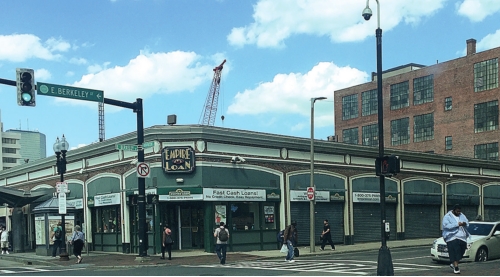
Corner of Berkeley and Washington Streets. The city seems to significantly lack oversight for its Main Streets program, as in just two years one program has quietly imploded and another has allegedly defrauded it of over $32,000. And it won’t answer questions about what its current oversight system looks like.
The Boston Main Streets program is a group of 20 miniature non-profit organizations that function as business districts.
They help drive tourism, business and community events for some of the city’s farther out neighborhoods. The Boston Main Streets Foundation, which oversees the distribution of funds to each district, is a public-private partnership with the city.
“Main Streets use a comprehensive revitalization approach,” the city website’s description of the program reads.
“We
want to create, build, and sustain healthy commercial districts.” But
in the past year, two Main Streets programs have apparently evaded city
oversight.
The most
recent was Three Squares Main Streets in Jamaica Plain, which was
accused earlier this month by the city’s finance commission of misusing
over $32,000 of taxpayer-funded grant money using altered bank
statements. The district encompasses 10,000 residents and 140 store
front businesses, and includes Boston’s culturally recognized Latin
Quarter. At time of writing, that money is still unaccounted for.
“We are going to get to the bottom of exactly what happened here,” Mayor Michelle Wu told CBS News at the time.
But
additionally, last year, the Washington Gateway Main Streets (WGMS)
program in the South End quietly imploded. A city spokesperson told The Boston Guardian last year that it had not been able to contact WGMS, and that the district had not even applied for funding.
Mario
Nicosia, the chief operating officer of GTI Properties in the South
End, rented office space to WGMS before the organization went quiet. He
said they had been behind on rent payments long before the announcement
last March that they were no longer in compliance with the city.
“They
owed us a lot of money,” Nicosia said. “Years of rent. At least one
year, maybe three. They never responded to us. We texted them, sent
things. We emailed them two times. They never responded.”
Nicosia
said he had charged WGMS about $1,000 per month in rent, which would
account for a nearly a quarter of the total $50,000 in funding allotted
to each Main Streets program by the city every year.
“In
my opinion, everyone in City Hall is doing their thing, whatever the
thing may be, but I think there are a lot of people doing the wrong
thing,” Nicosia said. “Maybe a little bit too much delegation of power.
Maybe not enough oversight. Without having any specifics, that’s my
opinion.”
According to
the most recent publicly available non-profit filings by WGMS, which
date to 2021, the organization had been losing money every year since
2017. Yet, despite the fact that it was declared not to be in compliance
last March, WGMS’s information is still listed on both the Boston Main
Streets Foundation and Boston city webpages as an active organization.
According to one South End resident, the district’s banners are also
still posted throughout the neighborhood.
The
city did not respond to multiple requests for comment about the
oversight system for the Boston Main Streets programs. The Boston Main
Streets Foundation also did not respond to a request for comment.